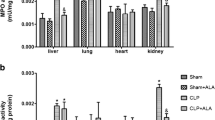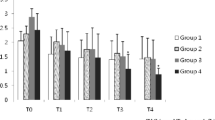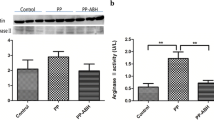Abstract
Background
We investigated the potential beneficial effect of the antioxidant 2-mercaptoethane-sulfonate (mesna) against oxidative stress induced by pneumoperitoneum in splanchnic organs.
Methods
Wistar rats were subjected to either (a) CO2 pneumoperitoneum (15 mmHg for 60 min) (group P), (b) pretreatment with mesna (400 mg/kg, p.o.) followed by pneumoperitoneum with a 180 min interval (group MP), (c) sham operation (group S), or (d) administration of mesna only (group M). Forty-five minutes after desufflation (groups P and MP), 60 + 45 min after the induction of anesthesia (group S), or 180 min after mesna administration (group M), tissue specimens were excised from liver, kidneys, jejunum and stomach. Tissue oxidative state was assessed on the basis of glutathione-to-glutathione disulfide ratio, malondialdehyde concentration , and superoxide dismutase activity.
Results
Pneumoperitoneum deteriorated all the oxidative stress markers in the organs studied. Mesna prevented the occurrence of oxidative stress following pneumoperitoneum in all the organs studied. In the absence of pneumoperitoneum, the administration of mesna caused mild enhancement of the oxidative state of liver, stomach, and kidneys compared to sham controls.
Conclusions
Prophylaxis with mesna prevents oxidative stress induced by pneumoperitoneum in splanchnic organs.





Similar content being viewed by others
References
Eleftheriadis E, Kotzampassi K, Papanotas K, Heliadis N, Sarris K (1996) Gut ischemia, oxidative stress, and bacterial translocation in elevated abdominal pressure in rats. World J Surg 20:11–16
Pross M, Schulz HU, Flechsig A, Manger T, Halangk W, Augustin W, Lippert H, Reinheckel T (2000) Oxidative stress in lung tissue induced by CO(2) pneumoperitoneum in the rat. Surg Endosc 14:1180–1184
de Souza AM, Wang CC, Chu CY, Lam PM, Rogers MS (2003) The effect of intra-abdominal pressure on the generation of 8-iso prostaglandin F2alpha during laparoscopy in rabbits. Hum Reprod 18:2181–2188
Yilmaz S, Polat C, Kahraman A, Koken T, Arikan Y, Dilek ON, Gokce O (2004) The comparison of the oxidative stress effects of different gases and intra-abdominal pressures in an experimental rat model. J Laparoendosc Adv Surg Tech A 14:165–168
Glantzounis GK, Tselepis AD, Tambaki AP, Trikalinos TA, Manataki AD, Galaris DA, Tsimoyiannis EC, Kappas AM (2001) Laparoscopic surgery-induced changes in oxidative stress markers in human plasma. Surg Endosc 15:1315–1319
Polat C, Kahraman A, Yilmaz S, Koken T, Serteser M, Akbulut G, Arikan Y, Dilek ON, Gokce O (2003) A comparison of the oxidative stress response and antioxidant capacity of open and laparoscopic hernia repairs. J Laparoendosc Adv Surg Tech A 13:167–173
Ishizaki Y, Bandai Y, Shimomura K, Abe H, Ohtomo Y, Idezuki Y (1993) Changes in splanchnic blood flow and cardiovascular effects following peritoneal insufflation of carbon dioxide. Surg Endosc 7:420–423
Chiu AW, Chang LS, Birkett DH, Babayan RK (1995) The impact of pneumoperitoneum, pneumoretroperitoneum, and gasless laparoscopy on the systemic and renal hemodynamics. J Am Coll Surg 181:397–406
McDougall EM, Bennett HF, Monk TG, Siegel CL, Li D, McFarland EG, Clayman RV, Sharp T, Rayala HJ, Miller SB, Haacke EM (1997) Functional MR imaging of the porcine kidney: physiologic changes of prolonged pneumoperitoneum. JSLS 1:29–35
Schafer M, Sagesser H, Reichen J, Krahenbuhl L (2001) Alterations in hemodynamics and hepatic and splachnic circulation during laparoscopy in rats. Surg Endosc 15:1197–1201
Yilmaz S, Koken T, Tokyol C, Kahraman A, Akbulut G, Serteser M, Polat C, Gokce C, Gokce O (2003) Can preconditioning reduce laparoscopy-induced tissue injury? Surg Endosc 17:819–824
Yilmaz S, Ates E, Polat C, Koken T, Tokyol C, Akbulut G, Gokce O (2003) Ischemic preconditioning decreases laparoscopy-induced oxidative stress in small intestine. Hepatogastroenterology 50:979–982
Cevrioglu AS, Yilmaz S, Koken T, Tokyol C, Yilmazer M, Fenkci IV (2004) Comparison of the effects of low intra-abdominal pressure and ischaemic preconditioning on the generation of oxidative stress markers and inflammatory cytokines during laparoscopy in rats. Hum Reprod 19:2144–2151
Ates E, Yilmaz S, Ihtiyar E, Yasar B, Karahuseyinoglu E (2006) Preconditioning-like amelioration of erythropoietin against laparoscopy-induced oxidative injury. Surg Endosc 20:815–819
Cay A, Imamoglu M, Unsal MA, Aydin S, Alver A, Akyol A, Sarihan H (2006) Does anti-oxidant prophylaxis with melatonin prevent adverse outcomes related to increased oxidative stress caused by laparoscopy in experimental rat model? J Surg Res 135:2–8
Dechant KL, Brogden RN, Pilkington T, Faulds D, Ifosfamide/mesna (1991) A review of its antineoplastic activity, pharmacokinetic properties and therapeutic efficacy in cancer. Drugs 42:428–467
Haselberger MB, Schwinghammer TL (1995) Efficacy of mesna for prevention of hemorrhagic cystitis after high-dose cyclophosphamide therapy. Ann Pharmacother 29:918–921
Siu LL, Moore MJ (1998) Use of mesna to prevent ifosfamide-induced urotoxicity. Support Care Cancer 6:144–154
Kabasakal L, Sehirli AO, Cetinel S, Cikler E, Gedik N, Sener G (2004) Mesna (2-mercaptoethane sulfonate) prevents ischemia/reperfusion induced renal oxidative damage in rats. Life Sci 75:2329–2340
Sener G, Sehirli O, Ercan F, Sirvanci S, Gedik N, Kacmaz A (2005) Protective effect of MESNA (2-mercaptoethane sulfonate) against hepatic ischemia/reperfusion injury in rats. Surg Today 35:575–580
Ypsilantis P, Lambropoulou M, Tentes I, Kortsaris A, Papadopoulos N, Simopoulos C (2006) Mesna protects intestinal mucosa from ischemia-reperfusion injury. J Surg Res 134:278–284
Ypsilantis P, Tentes I, Lambropoulou M, Anagnostopoulos K, Papadopoulos N, Kortsaris A, Simopoulos C (2008) Prophylaxis with mesna prevents oxidative stress induced by ischemia-reperfusion in the intestine via inhibition of nuclear factor-κB activation. J Gastroen Hepatol 23:328–335
Bradford MM (1976) A rapid and sensitive method for the quantitation of microgram quantities of protein utilizing the principle of protein-dye binding. Anal Biochem 72:248–254
Bearden JC Jr (1978) Quantitation of submicrogram quantities of protein by an improved protein-dye binding assay. Biochim Biophys Acta 533:525–529
Toyokuni S (1999) Reactive oxygen species-induced molecular damage and its application in pathology. Pathol Int 49:91–102
Brivida K, Sies H (1994) Non enzymatic antioxidant defense system. In: Frei B (ed) Natural Antioxidants in Human Health and Disease. Academic Press, San Diego, pp 107–128
de Zwart LL, Meerman JH, Commandeur JN, Vermeulen NP (1999) Biomarkers of free radical damage applications in experimental animals and in humans. Free Radic Biol Med 26:202–226
Carden DL, Granger DN (2000) Pathophysiology of ischaemia-reperfusion injury. J Pathol 190:255–266
Granger DN, Korthuis RJ (1995) Physiologic mechanisms of postischemic tissue injury. Annu Rev Physiol 57:311–332
Windberger UB, Auer R, Keplinger F, Längle F, Heinze G, Schindl M, Losert UM (1999) The role of intra-abdominal pressure on splanchnic and pulmonary hemodynamic and metabolic changes during carbon dioxide pneumoperitoneum. Gastrointest Endosc 49:84–91
Stofer-Vogel B, Cerny T, Borner M, Lauterburg BH (1993) Oral bioavailability of mesna tablets. Cancer Chemother. Pharmacol 32:78–81
Gressier B, Cabanis A, Lebegue S, Brunet C, Dine T, Luyckx M, Cazin M, Cazin JC (1994) Decrease of hypochlorous acid and hydroxyl radical generated by stimulated human neutrophils: comparison in vitro of some thiol-containing drugs. Methods Find Exp Clin Pharmacol 16:9–13
Pahl HL (1999) Activators and target genes of Rel/NF-κB transcription factors. Oncogene 18:6853–6866
Gloire G, Legrand-Poels S, Piette J (2006) NF-kappa B activation by reactive oxygen species: fifteen years later. Biochem Pharmacol 72:1493–1505
Schulze-Osthoff K, Beyaert R, Vandevoorde V, Haegeman G, Fiers W (1993) Depletion of the mitochondrial electron transport abrogates the cytotoxic and gene-inductive effects of TNF. EMBO J 12:3095–3104
Sen CK, Roy S, Packer L (1996) Involvement of intracellular Ca2+ in oxidant-induced NF-kappa B activation. FEBS Lett 385:58–62
Manna SK, Kuo MT, Aggarwal BB (1999) Overexpression of gamma-glutamylcysteine synthetase suppresses tumor necrosis factor-induced apoptosis and activation of nuclear transcription factor-kappa B and activator protein-1. Oncogene 18:4371–4382
Author information
Authors and Affiliations
Corresponding author
Rights and permissions
About this article
Cite this article
Ypsilantis, P., Tentes, I., Anagnostopoulos, K. et al. Mesna protects splanchnic organs from oxidative stress induced by pneumoperitoneum. Surg Endosc 23, 583–589 (2009). https://doi.org/10.1007/s00464-008-9887-y
Received:
Revised:
Accepted:
Published:
Issue Date:
DOI: https://doi.org/10.1007/s00464-008-9887-y




